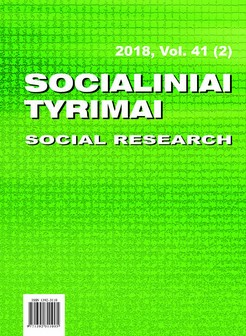Švietimo įstaigų vadovų kompetencijų vertinimo kaita Lietuvoje
Changing Assessment of the Educational Institution Manager’s Competencies in Lithuania
Author(s): Laima Liukinevičienė, Lina AntanavičienėSubject(s): Government/Political systems, History of Education, State/Government and Education, Transformation Period (1990 - 2010), Present Times (2010 - today), EU-Accession / EU-DEvelopment
Published by: Vilniaus Universiteto Leidykla
Keywords: assessment system; assessment of managerial competencies; head of educational institution;
Summary/Abstract: Education is one of the key areas in the development of a democratic state. Educational institutions and organizations are keen on innovations, therefore, certain public administration initiatives are often primarily and successfully implemented here. This also applies to the assessment of managers’ competencies and the development of leadership competencies as well. In recent decades, Lithuanian scientists have been intensively analyzing the experience gained in other countries while evaluating competencies of the heads of educational institutions and actively participating in the development of competence assessment tools. At present, the state of Lithuania has reached the stage where the assessment systems have already been tested and improved several times. Currently, applying the analytical content analysis of theoretical sources and other resources alongside, the aim is to summarize the developmental process of the manager’s competence assessment in Lithuania in 1998–2018, and highlight the key factors that have influenced the changing evaluation criteria. Having acknowledged the research-based truths (the manager’s competence assessment is necessary for the long-term effectiveness of the institutional activities; direct link between the results of an institution and the competencies of its leader is obvious; the content of the competency-packet necessary in order to control the continuous management is inclined to change; the LR evaluation system currently applied to the executive managers needs improvement; the LR system for improving managerial competencies of educational institution leaders is still being created, etc.), the necessity of regular periodical competence assessment and the need to constantly review the evaluation criteria and the models, seeking to improve them, are perceived. According to M. Fullan (1991), the most significant factor influencing the change in educational reforms is political, as educational reforms require a lot of resources. The analysis of the competence assessment of educational institution managers performed in the Republic of Lithuania confirms this statement. The need for high-level managerial competency-packet is highlighted in the following documents: programs of the main political parties seeking power over 20 years; Government programs of the Republic of Lithuania; educational strategies developed as part of the educational management structure; programs initiated, etc. The influence of EU education policy is obvious. The EU institutions provide general guidance to Member States, however, the initial training of educational institution managers and the improvement of their qualifications, the competence requirements and the recruitment procedures for the leaders/heads of educational institutions as well as their further career options are treated as an individual country’s project.
Journal: Socialiniai tyrimai
- Issue Year: 41/2018
- Issue No: 2
- Page Range: 32-47
- Page Count: 16
- Language: Lithuanian

